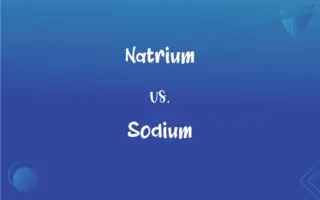Lecture vs. Workshop: What's the Difference?
Edited by Janet White || By Harlon Moss || Updated on November 11, 2023
A lecture is an educational talk to an audience, mainly one-way communication, while a workshop involves interactive, hands-on learning activities.

Key Differences
Lectures typically involve a speaker delivering information to an audience, focusing on theory or knowledge dissemination. In contrast, workshops are interactive sessions where participants engage in practical activities or discussions, emphasizing hands-on experience.
The lecture format is generally more formal, with less interaction between the lecturer and the audience. Workshops, however, encourage active participation, collaboration, and often require direct involvement in tasks or exercises.
Lectures are often used in academic settings to cover a specific topic or subject matter in a structured manner. Workshops are more flexible, designed to develop skills, solve problems, or foster creativity through practical engagement.
In a lecture, the flow of information is mostly one-directional, from the lecturer to the audience. In a workshop, the flow of information is multi-directional, with participants contributing ideas and learning from each other.
Lectures often rely on presentations, speeches, or readings, with limited audience interaction. Workshops are characterized by activities, group work, and discussions, promoting experiential learning.
ADVERTISEMENT
Comparison Chart
Format
Formal, one-way communication
Interactive, hands-on learning
Setting
Academic, conference
Educational, corporate, community
Participation
Passive audience listening
Active participant engagement
Primary Objective
Disseminating knowledge, theory
Skill development, practical application
Method of Delivery
Speeches, presentations
Activities, group tasks, discussions
ADVERTISEMENT
Lecture and Workshop Definitions
Lecture
A lecture is an educational talk to an audience on a specific subject.
She attended a lecture on medieval history at the university.
Workshop
A workshop is an interactive session focused on hands-on learning.
I'm attending a photography workshop this weekend.
Lecture
Lecture refers to a formal presentation of information by an expert.
The professor gave a lecture on quantum mechanics.
Workshop
A workshop can be a space for collaborative problem-solving.
We organized a workshop to tackle community issues collaboratively.
Lecture
A lecture is often a component of academic teaching.
His lecture series on philosophy is very popular among students.
Workshop
A workshop is a practical educational session with active participation.
She facilitated a workshop on creative writing.
Lecture
Lectures are used for delivering theoretical or specialized knowledge.
There will be a guest lecture on climate change next week.
Workshop
Workshop refers to a meeting at which a group engages in intensive discussion and activity on a particular subject.
The team held a workshop to brainstorm new marketing strategies.
Lecture
A lecture can be a public address on an important or topical issue.
The mayor's lecture on urban development was well-received.
Workshop
Workshops are designed for skill-building and practical application.
The coding workshop helped me understand the basics of programming.
Lecture
An exposition of a given subject delivered before an audience or class, as for the purpose of instruction.
Workshop
A room, area, or small establishment where manual or light industrial work is done.
Lecture
An earnest admonition or reproof; a reprimand.
Workshop
An educational seminar or series of meetings emphasizing interaction and exchange of information among a usually small number of participants
A creative writing workshop.
Lecture
To deliver a lecture or series of lectures.
FAQs
What is a lecture?
A lecture is a formal presentation on a particular subject, often in an academic setting.
Can lectures be part of a course?
Yes, lectures are commonly part of academic courses.
Do workshops involve hands-on activities?
Yes, workshops emphasize hands-on activities and participant involvement.
What is a workshop?
A workshop is an interactive learning session focused on practical skill-building.
How long is a typical lecture?
Lectures can vary but often last from 45 minutes to an hour.
Do lectures require preparation by participants?
Generally, lectures don’t require prior preparation by attendees.
Are workshops suitable for team building?
Yes, workshops are often used for team building and collaborative learning.
What’s the typical duration of a workshop?
Workshops can range from a few hours to multiple days.
Are lectures interactive?
Typically, lectures involve limited interaction, focusing more on information delivery.
Can workshops be customized?
Workshops are often customizable to fit specific group needs or goals.
Can lectures be recorded?
Lectures are often recorded for later review or distance learning.
Do lectures use multimedia tools?
Many lectures now incorporate multimedia tools like slideshows or videos.
Can lectures be interactive?
Some modern lectures include interactive elements, though traditionally they are less so.
Are workshops effective for practical skills?
Yes, workshops are particularly effective for developing practical, hands-on skills.
Is a lecture a good format for detailed information?
Yes, lectures are suitable for delivering detailed and structured information.
Who facilitates a workshop?
Workshops are facilitated by a trainer, educator, or subject expert.
Who leads a lecture?
Lectures are usually led by an expert or educator.
Are workshops better for active learning?
Yes, workshops are designed for active, experiential learning.
What is the main difference in learning outcomes between lectures and workshops?
Lectures are better for theoretical understanding, while workshops excel in practical skill application.
Should participants prepare for workshops?
Some workshops might require preparatory work or reading.
About Author
Written by
Harlon MossHarlon is a seasoned quality moderator and accomplished content writer for Difference Wiki. An alumnus of the prestigious University of California, he earned his degree in Computer Science. Leveraging his academic background, Harlon brings a meticulous and informed perspective to his work, ensuring content accuracy and excellence.
Edited by
Janet WhiteJanet White has been an esteemed writer and blogger for Difference Wiki. Holding a Master's degree in Science and Medical Journalism from the prestigious Boston University, she has consistently demonstrated her expertise and passion for her field. When she's not immersed in her work, Janet relishes her time exercising, delving into a good book, and cherishing moments with friends and family.






































































